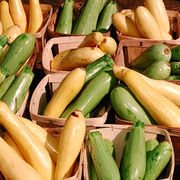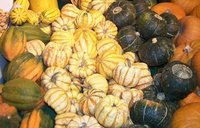
Last night at our church's monthly Ladies Fellowship, we shared many delicious dishes together. Our theme for this month was "Pumpkins and Squash" and the ladies showed up with a HUGE variety of meals, appetizers, desserts and drinks that were either pumpkin or squash related. We had a fantastic time!!
This is some information I shared about the winter and summer squashes. I love the way that the Lord created so many bright looking, good tasting vegetables that are so good for us, too!!!
History of Squash
Modern day squash developed from the wild squash that originated in an area between Guatemala and Mexico. Christopher Columbus brought squash back to Europe from the New World, and like other Native American foods, their cultivation was introduced throughout the world by Portuguese and Spanish explorers. Today, the largest commercial producers of squash include China, Japan, Romania, Turkey, Italy, Egypt, and Argentina.
Winter Squash
Winter squash is an excellent source of vitamin A. It is also a very good source of vitamin C, potassium, dietary fiber, and manganese. In addition, winter squash is a good source of folate, omega-3 fatty acids, thiamin, copper, vitamin B5, vitamin B6, niacin and copper.
Modern day squash developed from the wild squash that originated in an area between Guatemala and Mexico. Christopher Columbus brought squash back to Europe from the New World, and like other Native American foods, their cultivation was introduced throughout the world by Portuguese and Spanish explorers. Today, the largest commercial producers of squash include China, Japan, Romania, Turkey, Italy, Egypt, and Argentina.
Winter Squash
Winter squash is an excellent source of vitamin A. It is also a very good source of vitamin C, potassium, dietary fiber, and manganese. In addition, winter squash is a good source of folate, omega-3 fatty acids, thiamin, copper, vitamin B5, vitamin B6, niacin and copper.
Varieties of winter squash include:
Butternut squash: Shaped like a large pear, this squash has cream-colored skin, deep orange-colored flesh and a sweet flavor.
Acorn squash: With harvest green skin speckled with orange patches and pale yellow-orange flesh, this squash has a unique flavor that is a combination of sweet, nutty and peppery.
Hubbard squash: A larger-sized squash that can be dark green, grey-blue or orange-red in color, the Hubbard's flavor is less sweet than many other varieties.
Turban squash: Green in color and either speckled or striped, this winter squash has an orange-yellow flesh whose taste is reminiscent of hazelnuts.
Pumpkins: The pumpkin with the most flesh and sweetest taste is the small sized one known as sugar or pie pumpkin, the latter referring to its most notable culinary usage.
This group also includes acorn squash (available all year-round), butternut squash, buttercup squash, green and blue hubbard squash, green and gold delicious squash, and banana squash. Winter squash is most plentiful from early fall until late winter
Summer Squash
Summer squash is an excellent source of manganese and vitamin C. It is also a very good source of magnesium, vitamin A, dietary fiber, potassium, copper, folate, and phosphorous. In addition, summer squash is a good source of omega-3 fatty acids, vitamin B1, vitamin B2, vitamin B6, calcium, zinc, niacin, and protein.
Varieties of summer squash include:
Zucchini: Probably the best known of the summer squashes, zucchini is a type of narrow squash that resembles a cucumber in size and shape. It has smooth, thin skin that is either green or yellow in color and can be striped or speckled. Its tender flesh is creamy white in color and features numerous seeds. Its edible flowers are often used in French and Italian cooking.
Crookneck and Straightneck Squash: Both of these summer squashes have creamy white flesh and generally have yellow skins, although sometimes you can find them with green skin. Crookneck squash is partially straight with a swan-like neck. It was genetically modified to produce its Straightneck cousin that is shaped as its name implies.
Pattypan Squash: This small saucer-shaped squash features skin that can either be pale green or golden yellow in color. Its cream-colored flesh is more dense and slightly sweeter than the zucchini.
They also include the yellow crookneck, the large Straightneck, the greenish-white patty pan (petit pan), and the slender green zucchini. The EPA would also include crookneck squash, scallop squash, spaghetti squash, Chinese okra, bitter melon, balsam pear, balsam apple, Chinese cucumber, and chayote. Some of these squash are available at all times of the year.












6 comments:
Thank you for posting all this information on squash - one of my favorite foods! I love zucchini, acorn and especially butternut squash!
Kelli
I love all kinds of squash. Unfortunately, my family doesn't share that sentiment :) I would love to try growing some different varieties when I have a garden next year.
Wow, thanks for the wonderful education on squash. Who knew??!! Squash is something that I REFUSED to eat as a child, "yes, I was a naughty girl!" but it is something as I have grown older I have acquired a taste for!
I recently discovered acorn squash. It's sweet taste is just want my family loves.
This is great! I'm going to link to it :D
I used to hate ALL squash when I was growing up. Then all of a sudden... I LOVE IT ALL!! I don't know why. I cannot explain it. For that matter, I don't care what happened, I'm just glad it did! My taste buds practically throw a party everytime I have something with one of the squashes in it- especially pumpkin!!! Just today, I made some pumpkin black bean soup. OH MY STARS it's good!
His,
Mrs. U
Post a Comment